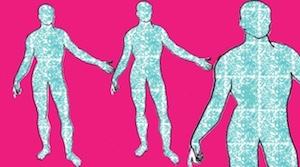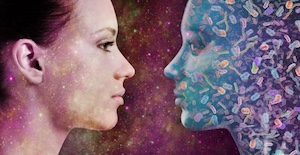The Healer Within and Our Microbiome
Holistically working with the micobiome and energy medicine is a large part of future of Western medicine and will dominate in the latter 21st Century. Western medicine is just discovering the importance of the microbiome. Researchers are already finding connections between the immune response and disease. A major component of the body's immune response is generated by the microbiome. Autoimmune disorders (i.e. they can't figure it out so they use this term) are being traced to imbalances or dysfunction in the gut microbiome. He mentions the example of an incorrect mix (individualized for each person, just like holistic medicine) of microbiota species (e.g. bifidobacterium) leads to an incorrect or non-existent immune response (i.e. an "autoimmune disorder").
Note that the enteric nervous system which is the extension of the autonomic nervous system to and through the gut (i.e. it is the nervous system of the microbiota/gut) is connected to the central nervous system via the vagus nerve. Qigong directly affects the vagus nerve in a very positive way, and that's another reason why Qigong practice is so simple yet powerful.
Exposure to prescribed medication in early life and impacts on gut microbiota and disease development. PMCID: PMC10835216.
Our Mental Health Is Determined by an Intrinsic Interplay between the Central Nervous System, Enteric Nerves, and Gut Microbiota. Intercommunications between the gut and CNS regulate mood, cognitive behavior, and neuropsychiatric disorders such as autism, depression, and schizophrenia. The modulation, development, and renewal of nerves in the ENS and changes in the gut microbiome alter the synthesis and degradation of neurotransmitters, ultimately influencing our mental health. PMID: 38203207.
Monitoring in vivo neural activity to understand gut-brain signaling. This review emphasizes recent studies that have advanced our knowledge of gut-brain signaling and food intake control, with a focus on how gut signaling influences in vivo neural activity in animal models. Moving forward, dissecting the complex pathways and circuits that transmit nutritive signals from the gut to the brain will reveal fundamental principles of energy balance, ultimately enabling new treatment strategies for diseases rooted in body weight control [PMID: 33558881].
Human Body Microbes Make Antibiotics, Study Finds. Each of us has a microbiome which is a component of our 'healer within' and is a major beneficiary of Qigong practice. Our microbiome can be considered part of our internal "pharmacy" where we can get safe and natural personalized drugs. New  research, funded in part by NCCIH, suggests that some of the bacteria that share our human bodies manufacture antibiotics and that these substances may be capable of fighting infection. The researchers, from the University of California, San Francisco; the University of California, Santa Cruz; Indiana University; Washington University School of Medicine; and Harvard Medical School, published their findings in a recent issue of the journal Cell:
research, funded in part by NCCIH, suggests that some of the bacteria that share our human bodies manufacture antibiotics and that these substances may be capable of fighting infection. The researchers, from the University of California, San Francisco; the University of California, Santa Cruz; Indiana University; Washington University School of Medicine; and Harvard Medical School, published their findings in a recent issue of the journal Cell:
 A systematic analysis of biosynthetic gene clusters in the human microbiome reveals a common family of antibiotics. Our findings illustrate the widespread distribution of small-molecule-encoding biosynthetic gene clusters in the human microbiome, and they demonstrate the bacterial production of drug-like molecules in humans.
A systematic analysis of biosynthetic gene clusters in the human microbiome reveals a common family of antibiotics. Our findings illustrate the widespread distribution of small-molecule-encoding biosynthetic gene clusters in the human microbiome, and they demonstrate the bacterial production of drug-like molecules in humans.

Neurotransmitter modulation by the gut microbiota. The gut microbiota - the trillions of bacteria that reside within the gastrointestinal tract - has been found to not only be an essential component immune and metabolic health, but also seems to influence development and diseases of the enteric and central nervous system, including motility disorders, behavioral disorders, neurodegenerative disease, cerebrovascular accidents, and neuroimmune-mediated disorders. Accumulating evidence in animals suggests that manipulation of these neurotransmitters by bacteria may have an impact in host physiology, and preliminary human studies are showing that microbiota-based interventions can also alter neurotransmitter levels.
Gut Bacteria and Neurotransmitters. Gut bacteria play an important role in the digestion of food, immune activation, and regulation of entero-endocrine signaling pathways, but also communicate with the central nervous system (CNS) through the production of specific metabolic compounds, e.g., bile acids, short-chain fatty acids (SCFAs), glutamate (Glu), γ-aminobutyric acid (GABA), dopamine (DA), norepinephrine (NE), serotonin (5-HT) and histamine. Afferent vagus nerve (VN) fibers that transport signals from the gastro-intestinal tract (GIT) and gut microbiota to the brain are also linked to receptors in the esophagus, liver, and pancreas. In response to these stimuli, the brain sends signals back to entero-epithelial cells via efferent VN fibers. Fibers of the VN are not in direct contact with the gut wall or intestinal microbiota. Instead, signals reach the gut microbiota via 100 to 500 million neurons from the enteric nervous system (ENS) in the submucosa and myenteric plexus of the gut wall. The modulation, development, and renewal of ENS neurons are controlled by gut microbiota, especially those with the ability to produce and metabolize hormones. PMCID: PMC9504309.
 The role of the gut microbiome in the development of schizophrenia. The development of the neural circuitry underlying social, cognitive and emotional domains requires precise regulation from molecular signalling pathways, especially during critical periods or "windows", when the brain is particularly sensitive to the influence of environmental input signalling. Many of the brain regions involved, and the molecular substrates sub-serving these domains are responsive to life-long microbiota-gut-brain (MGB) axis signalling. This intricate microbial signalling system communicates with the brain via the vagus nerve, immune system, enteric nervous system, enteroendocrine signalling and production of microbial metabolites, such as short-chain fatty acids. Preclinical data has demonstrated that MGB axis signalling influences neurotransmission, neurogenesis, myelination, dendrite formation and blood brain barrier development, and modulates cognitive function and behaviour patterns, such as, social interaction, stress management and locomotor activity.
The role of the gut microbiome in the development of schizophrenia. The development of the neural circuitry underlying social, cognitive and emotional domains requires precise regulation from molecular signalling pathways, especially during critical periods or "windows", when the brain is particularly sensitive to the influence of environmental input signalling. Many of the brain regions involved, and the molecular substrates sub-serving these domains are responsive to life-long microbiota-gut-brain (MGB) axis signalling. This intricate microbial signalling system communicates with the brain via the vagus nerve, immune system, enteric nervous system, enteroendocrine signalling and production of microbial metabolites, such as short-chain fatty acids. Preclinical data has demonstrated that MGB axis signalling influences neurotransmission, neurogenesis, myelination, dendrite formation and blood brain barrier development, and modulates cognitive function and behaviour patterns, such as, social interaction, stress management and locomotor activity.





 research, funded in part by NCCIH, suggests that some of the bacteria that share our human bodies manufacture antibiotics and that these substances may be capable of fighting infection. The researchers, from the University of California, San Francisco; the University of California, Santa Cruz; Indiana University; Washington University School of Medicine; and Harvard Medical School, published their findings in a recent issue of the journal Cell:
research, funded in part by NCCIH, suggests that some of the bacteria that share our human bodies manufacture antibiotics and that these substances may be capable of fighting infection. The researchers, from the University of California, San Francisco; the University of California, Santa Cruz; Indiana University; Washington University School of Medicine; and Harvard Medical School, published their findings in a recent issue of the journal Cell: